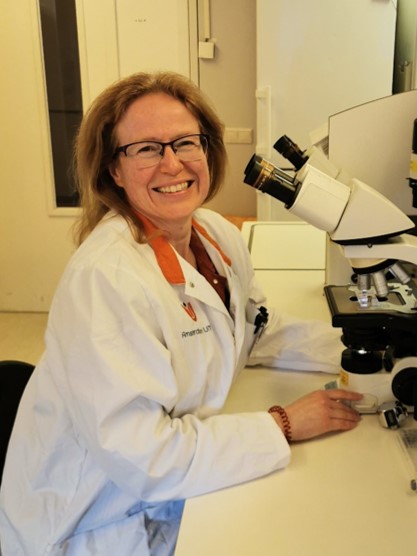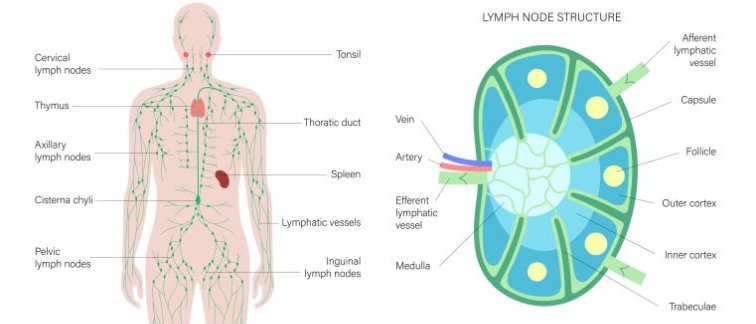euro to 15 Cancer Center Amsterdam research groups. One of the selected project
proposals is entitled “Arming local lymphoid tissues to increase the efficacy
of immunotherapy for non-small cell lung cancer” by Dr. Marieke Fransen, a
researcher in Translational ImmunoOncology (€ 765,118).
Tumor-draining lymph nodes are mainly seen as organs that must be removed to make the correct diagnosis and prevent further spread of tumor cells. But what if they are playing active roles in mobilizing the immune system against metastasized tumors? Could their removal actually be unfavorable in some cases?
With funding by KWF, Dr. Marieke Fransen plans to investigate how lymph nodes are involved in anti-tumor immune responses in patients with non-small cell lung cancer (NSCLC). “That lymph nodes play a very important role in the organization of immune responses against tumors is often overlooked,” says Dr. Fransen. “Even among scientists who study cancer immunotherapy, the lymph node is often left out of consideration.”
Effectiveness of immunotherapy
Recent studies, including ones# by Dr. Fransen and co-PI Professor de Gruijl have found that local lymphoid organs and lymphatic drainage to them are of great importance for the development and (re-)activation of the anti-tumor immune response, especially in treatment with immunotherapy. To maximize the potential of local lymphoid tissues, treatment with immunotherapy before planned surgical removal (also called neoadjuvant therapy) might be a good idea.
“The idea behind this is that there is a pool of antigens in the tumor, and many immune cells that could be activated, or reactivated, with immunotherapy against those tumor antigens before the tumor is removed,” explains Dr. Fransen. “This could also apply to immune cells in the local lymph nodes, which would be an additional advantage during treatment. But that is hardly ever discussed or investigated.”
Are lymph nodes helping?
With early positive results from experimental neoadjuvant treatments in hand, Dr. Fransen and her team need to determine if the positive responses are mainly due to cells from the tumor and / or the lymph nodes.
“We plan to analyze which different immune cells are in the lymph nodes, what their activation status is, and whether this can be associated with the presence or absence of tumor cells in the lymph nodes,” says Dr. Fransen. In addition, chemokines and cytokines, signaling molecules known to be involved in migration and activation of immune cells, will be analyzed in serum, lymph nodes, and tumor cells from patient with NSCLC.
All data obtained will be related to clinical data and results of immunotherapy, i.e., how well the patient responded to the immunotherapy. Patients who were untreated before the lung tumor was surgically removed or underwent a combination of neoadjuvant chemoradiotherapy and immunotherapy will be included.
Fine-tuning the immune response
Dr. Fransen: “Based on our findings, we will further investigate in vitro, using cell material from tumor-draining lymph nodes, which immune modulating agents can be used to optimally strengthen the immune response in the glands and thus increase the chance of success of immunotherapy.”
A deeper understanding of the interactions between lung cancer, lymph nodes, and the immune system could identify ways to improve immunotherapy or new treatment regimens regarding immunotherapy and surgical removal of tissues.
“Detailing the role of local lymphoid tissues will also give us new insight into biomarkers - factors on which we can pre-classify patients on which type of treatment will have the greatest chance of success - and opportunities to design smart new combinations of immunotherapeutic treatments.”

Dr. Marieke Fransen
For more information, contact Dr. Marieke Fransen.
Researchers at Cancer Center Amsterdam involved in the study:
Dr. Marieke Fransen
Prof. Tanja de Gruijl
Dr. Idris Bahce
Dr. Febe van Maldegem
# Recent studies by Dr. Fransen and co-PI Professor de Gruijl investigating lymphoid organs and lymphatic drainage for the development and (re-)activation of the anti-tumor immune response:
- Koster, B.D., et al. (2017) Local Adjuvant Treatment with Low-Dose CpG-B Offers Durable Protection against Disease Recurrence in Clinical Stage I–II Melanoma: Data from Two Randomized Phase II Trials. 23 (19): 5679–5686. https://doi.org/10.1158/1078-0432.CCR-17-0944.
- Fransen, M.F., et al. (2018) Tumor-draining lymph nodes are pivotal in PD-1/PD-L1 checkpoint therapy. 3 (23):e124507. https://doi.org/10.1172/jci.insight.124507.
- Fransen, M.F., et a; (2021) Immune Checkpoint Therapy: Tumor Draining Lymph Nodes in the Spotlights. Int. J. Mol. Sci. 2021, 22, 9401. https://doi.org/10.3390/ijms22179401.
Information provided by Dr. Marieke Fransen, text by Laura Roy.

